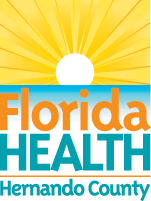It's a New Day in Public Health.
The Florida Department of Health works to protect, promote, and improve the health of all people in Florida through integrated state, county, and community efforts.
West Central Florida county health departments encourage residents to develop storm disaster plans
June 30, 2021
Hurricane season runs June 1-Nov 30
Brooksville, Fla. — With the 2021 hurricane season officially underway, West Central Florida county health departments are encouraging everyone to prepare for severe weather emergencies now.
West Central Florida county health departments include those serving Citrus, Hardee, Hernando, Highlands, Hillsborough, Manatee, Pasco, Pinellas, Polk and Sarasota counties.
Get A Plan!
A key way to cope with a disaster is to have a plan. Following an emergency or disaster, you may lose access to basic services, such as power and water, and be subject to limited or no access to essentials like food and water. The Florida Department of Emergency Management provides an interactive online tool, Get a Plan!, to help families and businesses stay prepared. This useful tool allows you to answer a series of questions and create a plan customized for you.
Make a Kit
As we stay on the lookout for upcoming storms, think about what to keep on hand in order to be prepared. The Florida Division of Emergency Management recommends that you build a kit to last you and your family for a minimum of seven days. Each individual or family disaster supply kit differs based on personal needs. Review the list below for the basic items to include in your kit. For more information, visit https://www.floridadisaster.org/planprepare/hurricane-supply-checklist/ .
- Water: Enough for drinking, cooking and sanitation purposes—pack a minimum of 1 gallon daily per person for 7 days.
- Food: Nonperishable packaged or canned food and juices, snacks and foods for those with dietary restrictions (i.e., infants, people with diabetes, etc.).
- Cooking Supplies: Manual can opener, cooking tools and fuel, paper plates and plastic utensils.
- Flashlight and extra batteries
- Pillows, blankets and/or sleeping bags
- Clothing: Complete change of clothes suitable for the current climate and include sturdy shoes to protect feet from debris or other sharp objects post-storm.
- First Aid Kit, Prescription Medication and Other Medicines: People with health issues may need to carry written instructions for care and medication (including medication dosages), a list of medical devices and a list of current doctors.
- Radio: Battery-operated and NOAA weather radio.
- Toiletries
- Cleaning Supplies: Garbage bags, moisture wipes and other items.
- Cash: Banks and ATMs may not be open or available for extended periods following a disaster.
- Important documents: Store all critical documents in a waterproof container and save electronically. Documents like insurance, medical records, bank account numbers, Social Security card, etc.
- Special Items: Assess all family member needs. Plan for infants, elderly and individuals with access and functional needs (i.e. medical items, baby bottles, diapers, etc.).
- Pet Care Items: Proper identification, immunization records, ample supply of food and water, carrier or cage, medications, muzzle and leash, and a photo of you and your pet together to validate ownership.
Know Where to Find Shelter
The time may arise when you may need to evacuate your home to go to a safer place. In certain situations, it may be safest for you to evacuate to a more secure location like a shelter. A hurricane evacuation shelter is a refuge of last resort, a place to go if you can’t stay at home or with a relative, friend or co-worker or at a nearby hotel. Hurricane shelters are also available for people who have no other place to go. The Florida Division of Emergency Management maintains a list of open shelters on their website.
If you have a disability or a special need such as a medical condition, it’s vital that you register with your local emergency management office. All emergency management offices maintain a list of people within the community who have disabilities or special needs so they can be assisted quickly during an emergency.
If you are eligible for a Special Needs Shelter, your kit should include the following: a list of medications and dosage, a 30-day supply of medications, vital medical equipment for those who may be electrically or oxygen dependent, backup energy sources for essential medical equipment, any special dietary needs or food, as well as personal information including photo ID, insurance card, emergency contacts, and your primary care providers contact information.
And if you have pets, be sure that the shelter has a place for them and their supplies.
Stay Connected.
During severe weather and other emergencies, stay connected to local radio, television and social media outlets.
The State Assistance Information Line (SAIL), a toll-free hotline, is activated to provide accurate and up-to-date information on emergency or disaster situations impacting the State of Florida. The SAIL hotline is: 1-800-342-3557.
You can also get helpful information from the Florida Department of Health’s official social media accounts. One of the fastest ways to receive accurate health-related information is to monitor @HealthyFla on Twitter and on Facebook.
For more information on how to prepare for hurricane season, please contact your West Central Florida county health department.
DOH-Citrus | (352) 527-0068 | DOH-Manatee | (941) 748-0747 |
DOH-Hardee | (863) 773-4161 | DOH-Pasco | (727) 619-0300 |
DOH-Hernando | (352) 540-6800 | DOH-Pinellas | (727) 824-6900 |
DOH-Highlands | (863) 386-6040 | DOH-Polk | (863) 519-7900 |
DOH-Hillsborough | (813) 307-8000 | DOH-Sarasota | (941) 861-2900 |
####
About the Florida Department of Health
The department, nationally accredited by the Public Health Accreditation Board, works to protect, promote and improve the health of all people in Florida through integrated state, county and community efforts.
Follow us on Facebook, Instagram and Twitter at @HealthyFla. For more information about the Florida Department of Health please visit www.FloridaHealth.gov.




Connect with DOH